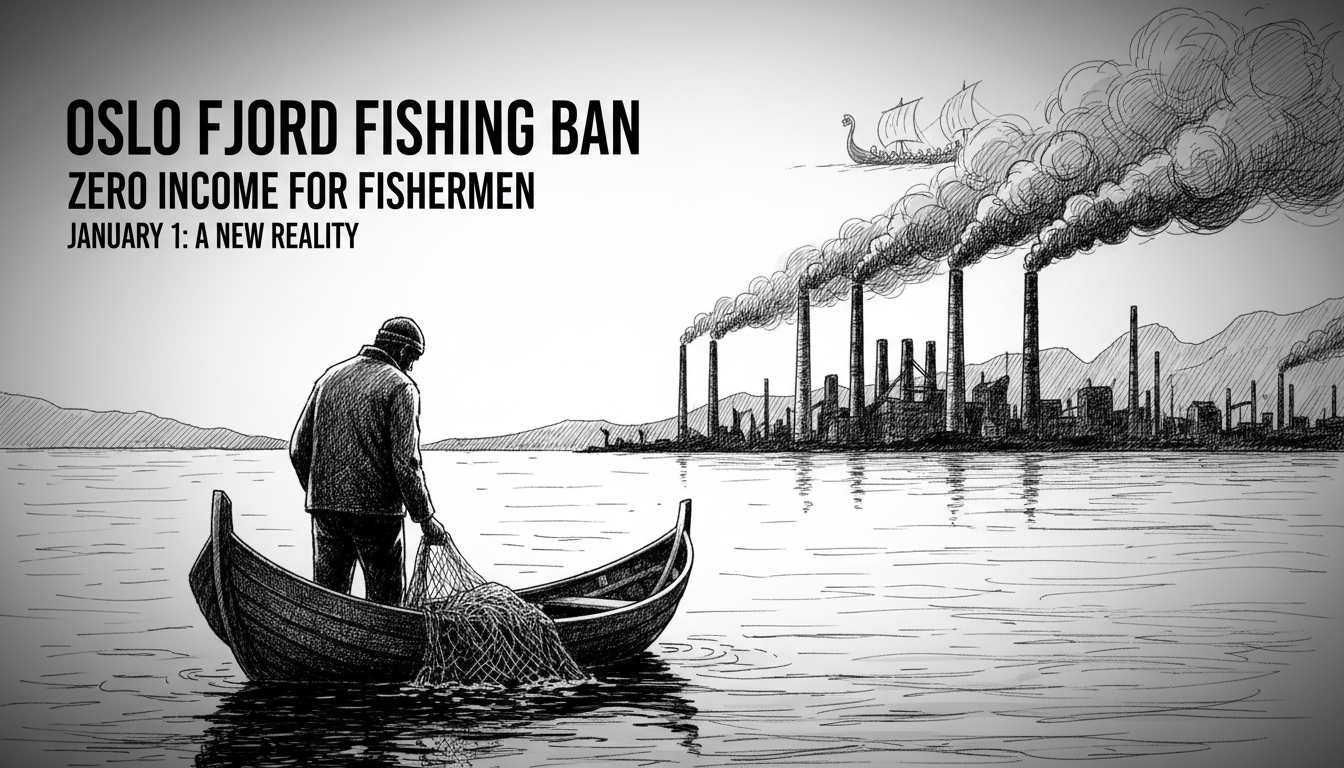When the clouds clear, I can see the city hall towers while I'm out trawling. The catch doesn't travel far.
It's early morning at Aker Brygge in Oslo. Shrimp fisherman Sigurd André Kristoffersen has just docked with his overnight catch.
For years he has fished between Nesodden and Asker, about 20 minutes by boat from Norway's capital. Soon he must find something else to do.
In two months, fishing will be banned in large parts of the Oslo Fjord. Pink-marked areas will close to fishing starting January 1.
The government has allocated 15 million kroner in the proposed state budget to help the fishing industry transition when the ban takes effect.
Sigurd André Kristoffersen will lose 100 percent of his income source.
"On January 1, I'll have zero income. I should at least get an emergency package to survive until I find something else," he said.
South Norway Fishermen's Association is fighting to secure fishermen's rights and future opportunities to make a living from the sea.
The association's Oslo leader Alessandro Astroza described the situation as brutal.
"Many people are affected both directly and indirectly. If they're to have a chance to adapt to the ban, more money needs to be on the table. Plain and simple," Astroza stated.
Astroza claims that until the framework for transition or possible compensation is clear, the fishing ban should be postponed until July 2026.
Official records show 287 professional fishermen operate around the Oslo Fjord, with about 110-120 vessels taking all or part of their catch there.
According to a report from research institute Nofima, many professional fishermen will be directly affected. Others will be indirectly impacted due to increased competition in remaining open areas.
Overfishing is one of five main causes of environmental problems in the Oslo Fjord. Bottom trawling destroys seabed life by leaving harmful traces.
The biggest culprit, however, is nitrogen flowing from agriculture and sewage systems on land. Nitrogen causes algae to grow too quickly. When algae die, they consume oxygen in the water, suffocating marine life.
While the fishing ban takes effect in January, company Chemring Nobel is building an explosives factory on Hurumlandet.
Fisherman Kristoffersen finds it frustrating that fishermen must pay so much of the total bill to save the fjord.
"The goal of saving the fjord is very good. But when the government starts cleaning up the fjord, they're working in backwards-land. The government allows emissions from explosives factories and sewage from land. The problem isn't us fishermen," he argued.
The fishermen's association also reacts to different industries facing different environmental requirements.
"Fishermen want to contribute. But we don't think it's fair that we should stop fishing while others continue their emissions," said leader Alessandro Astroza.
State Secretary in the Trade and Fisheries Ministry, Kristina Sigurdsdóttir Hansen, emphasized that 100 million kroner has been set aside in the state budget to strengthen work on the Oslo Fjord.
Of this, 15 million is allocated as transition funds for the fishing industry. The goal is to support those affected by the fishing ban.
When asked what the money will be used for, Hansen responded, "We're not entirely clear on what the money will be used for, but it's transition measures. And it's in connection with us having to take measures to get a rich and healthy Oslo Fjord back."
Asked whether 15 million kroner is enough, she said, "You can always wish for more money, but there are priorities in the state budget. We could probably use more, but we'll get some way with 15 million."
Further south in the Oslo Fjord, at Hvasser, shrimp fisherman Ivar Kanten stands firm. He's clear about what he thinks of the 15 million allocated.
"If we're to distribute this money among all those harmed by the closure, it's very little," Kanten stated.
His expectations are clear: "That the government takes us seriously. They must give us compensation for lost work during the period we can't fish. That's the only thing that can help us, and it must happen before January 1."
The government faces a difficult balancing act between environmental protection and livelihoods, with fishermen feeling they're bearing disproportionate costs while other industries continue polluting activities.
